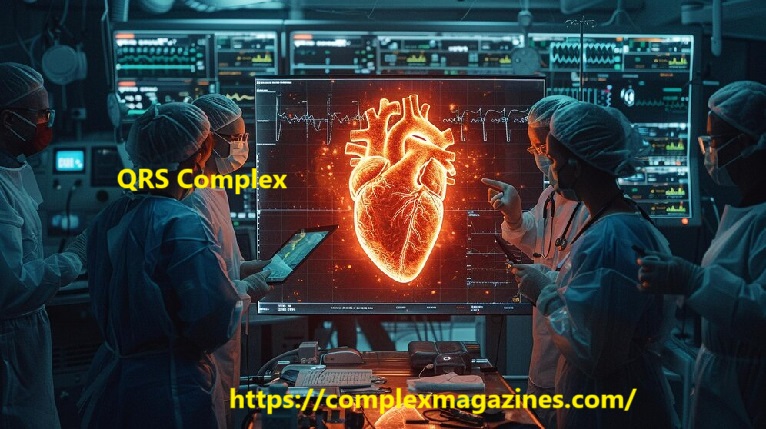
The human heart is a fascinating organ, working non-stop to keep us alive. But how does it do this? A big part of the heart’s functionality lies in its electrical system, particularly the QRS complex. In this article, we’ll dive deep into the QRS -complex, what it is, why it’s important, and what it can tell us about your heart’s health. Whether you’re someone who’s recently had an ECG or you’re just curious about how your heart works, this guide will break it all down for you in simple, easy-to-understand language.
1. What is the QRS Complex?
The QRS complex is a crucial part of your heart’s electrical activity that shows up on an electrocardiogram (ECG or EKG). But what does it actually mean? Simply put, the QRS complex represents the electrical impulses that cause the ventricles (the two lower chambers of the heart) to contract and pump blood throughout your body.
Think of the QRS complex as the “beat” in your heartbeat. It’s the moment when the heart is doing its heavy lifting, pushing blood out to the body. Without this vital electrical event, the heart wouldn’t function properly, and our bodies wouldn’t get the oxygenated blood they need.
2. The Anatomy of the QRS Complex
The QRS -complex is made up of three distinct waves: the Q wave, the R wave, and the S wave. Here’s a breakdown of what each wave represents:
- Q wave: This is the first downward deflection on the ECG before the main R wave.
- R wave: The tall, upward spike on the ECG that represents the bulk of the ventricular contraction.
- S wave: The small downward deflection that follows the R wave.
Together, these waves show how the electrical signal travels through the ventricles of your heart.
3. How the QRS Complex Works
The QRS complex is triggered by a signal from the heart’s natural pacemaker, called the sinoatrial (SA) node. The electrical signal travels through the heart’s conduction system, reaching the ventricles and causing them to contract. This action is what generates the QRS -complex on the ECG.
In other words, the QRS -complex shows the electrical impulse as it spreads through the ventricles, making them contract and push blood out to the lungs and the rest of the body.
4. Why the QRS Complex is Important
Why should we care about the QRS- complex? The answer is simple: it provides crucial insight into how well your heart is working. The QRS -complex is directly tied to the heart’s ability to pump blood efficiently. When something goes wrong with the QRS -complex, it often means there’s an issue with the heart’s electrical system or its muscle.
5. Understanding an ECG Reading
The electrocardiogram (ECG) is a test that measures the electrical activity of the heart. When you look at an ECG, the QRS complex stands out as the most noticeable spike. Understanding an ECG reading requires a basic knowledge of the different components:
- P wave: Represents atrial contraction.
- QRS complex: Ventricular contraction.
- T wave: Represents the heart’s recovery after contraction (repolarization).
The QRS complex is often the most important part of the ECG because it gives doctors a clear picture of how the ventricles are working.
6. Normal vs. Abnormal QRS Complex
A normal QRS complex shows that the heart is functioning correctly. Typically, a QRS -complex lasts between 0.06 to 0.10 seconds. When the QRS -complex is too wide or too narrow, it can be a sign of various heart conditions.
- Narrow QRS complex: Usually indicates normal electrical conduction.
- Wide QRS complex: May suggest a blockage in the heart’s conduction system or other abnormalities.
7. Causes of QRS Complex Abnormalities
Several factors can cause abnormalities in the QRS complex, including:
- Bundle branch block: When one of the pathways that the electrical signal takes to the ventricles is blocked.
- Ventricular hypertrophy: A condition where the heart’s walls are thickened.
- Heart attack (myocardial infarction): The QRS c-omplex can show changes after damage to the heart muscle.

8. How Doctors Analyze the QRS -Complex
Doctors look at several aspects of the QRS complex when analyzing an ECG:
- Width: How long the QRS- complex lasts.
- Height: The amplitude of the R wave.
- Shape: Whether the QRS -complex is sharp and narrow or wide and misshapen.
These details can help doctors determine if there is an underlying heart condition that needs attention.
9. Can You Improve Your QRS Complex?
You might be wondering, “Can I do anything to improve my QRS -complex?” The answer is somewhat complicated. Since the QRS- complex is tied to your heart’s overall health, keeping your heart in good condition through diet, exercise, and avoiding smoking or excessive alcohol can help maintain a healthy QRS -complex. However, if there’s an existing electrical issue in the heart, this might require medical intervention.
10. The Role of QRS Complex in Diagnosing Heart Disease
The QRS complex plays a vital role in diagnosing various heart diseases. For example, changes in the QRS -complex can indicate:
- Arrhythmias: Irregular heart rhythms.
- Heart attacks: The shape of the QRS -complex can change after heart damage.
- Heart block: A problem with the heart’s electrical system.
Doctors rely on changes in the QRS -complex to pinpoint specific heart issues and decide on the best course of treatment.
11. Factors That Affect the QRS Complex
Several factors can influence the appearance of the QRS -complex on an ECG:
- Medications: Some medications can alter the heart’s electrical activity.
- Electrolyte imbalances: Low levels of potassium or magnesium can affect the QRS -complex.
- Age: As people get older, changes in the heart muscle can affect the QRS -complex.
Conclusion
In conclusion, the QRS complex is a critical component of your heart’s electrical activity. It provides valuable insights into the health of your heart and can help doctors diagnose various conditions. By understanding how it works, what a normal QRS -complex looks like, and the factors that can cause abnormalities, you’re better equipped to make sense of your own heart health.
FAQs
1. What does the QRS -complex represent?
The QRS -complex represents the electrical impulses that cause the ventricles of the heart to contract.
2. What is considered a normal QRS -complex?
A normal QRS -complex lasts between 0.06 to 0.10 seconds and has a sharp, narrow appearance.
3. What causes a wide QRS -complex?
A wide QRS -complex can be caused by bundle branch block, ventricular hypertrophy, or other heart conditions.
4. Can lifestyle changes improve the QRS -complex?
Healthy lifestyle choices like regular exercise, a balanced diet, and avoiding smoking can help maintain a healthy heart, which can positively influence the QRS -complex.
5. How do doctors use the QRS -complex in diagnosing heart conditions?
Doctors analyze the width, shape, and amplitude of the QRS -complex to diagnose conditions like arrhythmias, heart attacks, and heart block.
Read More: Complex Magazines

